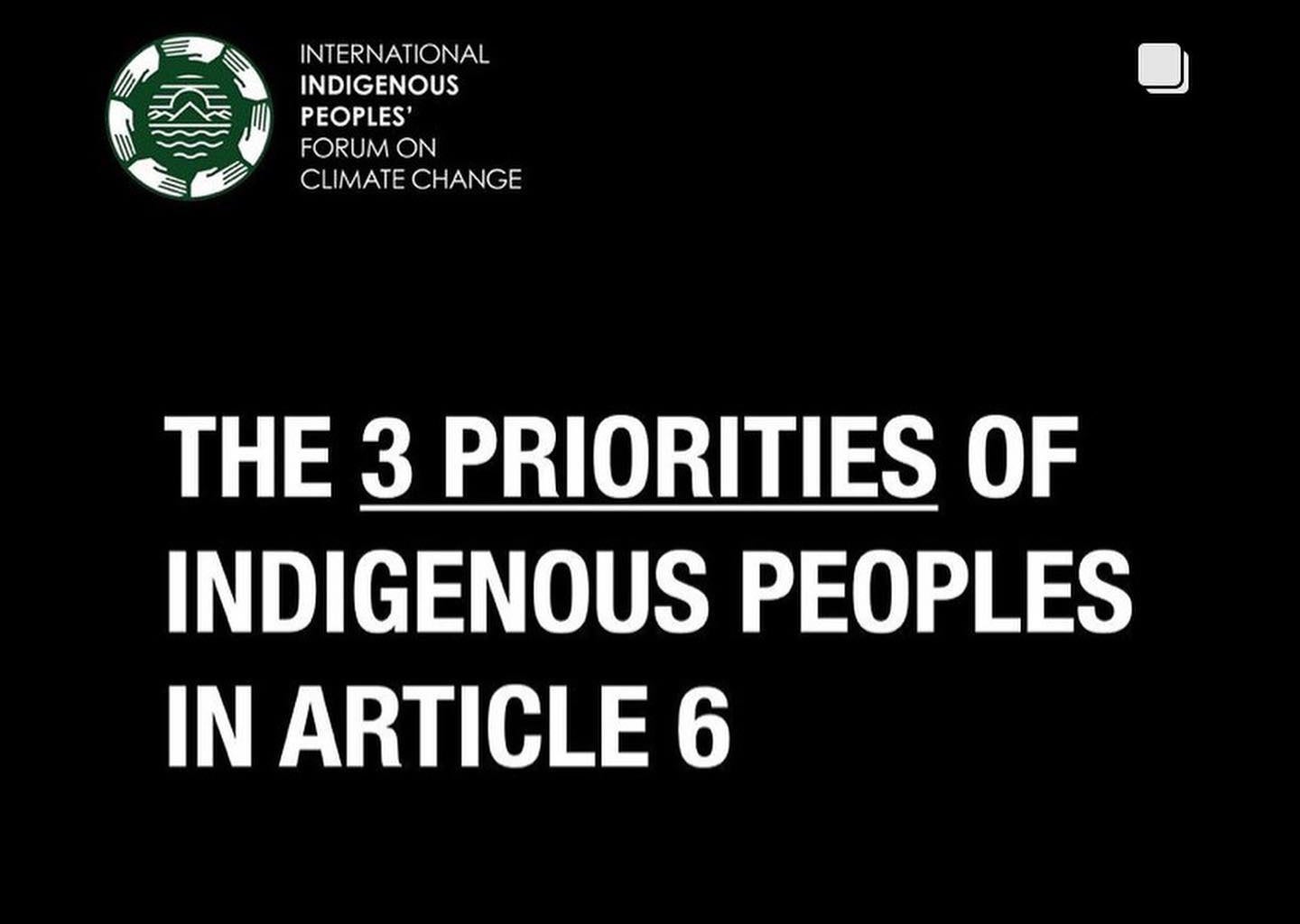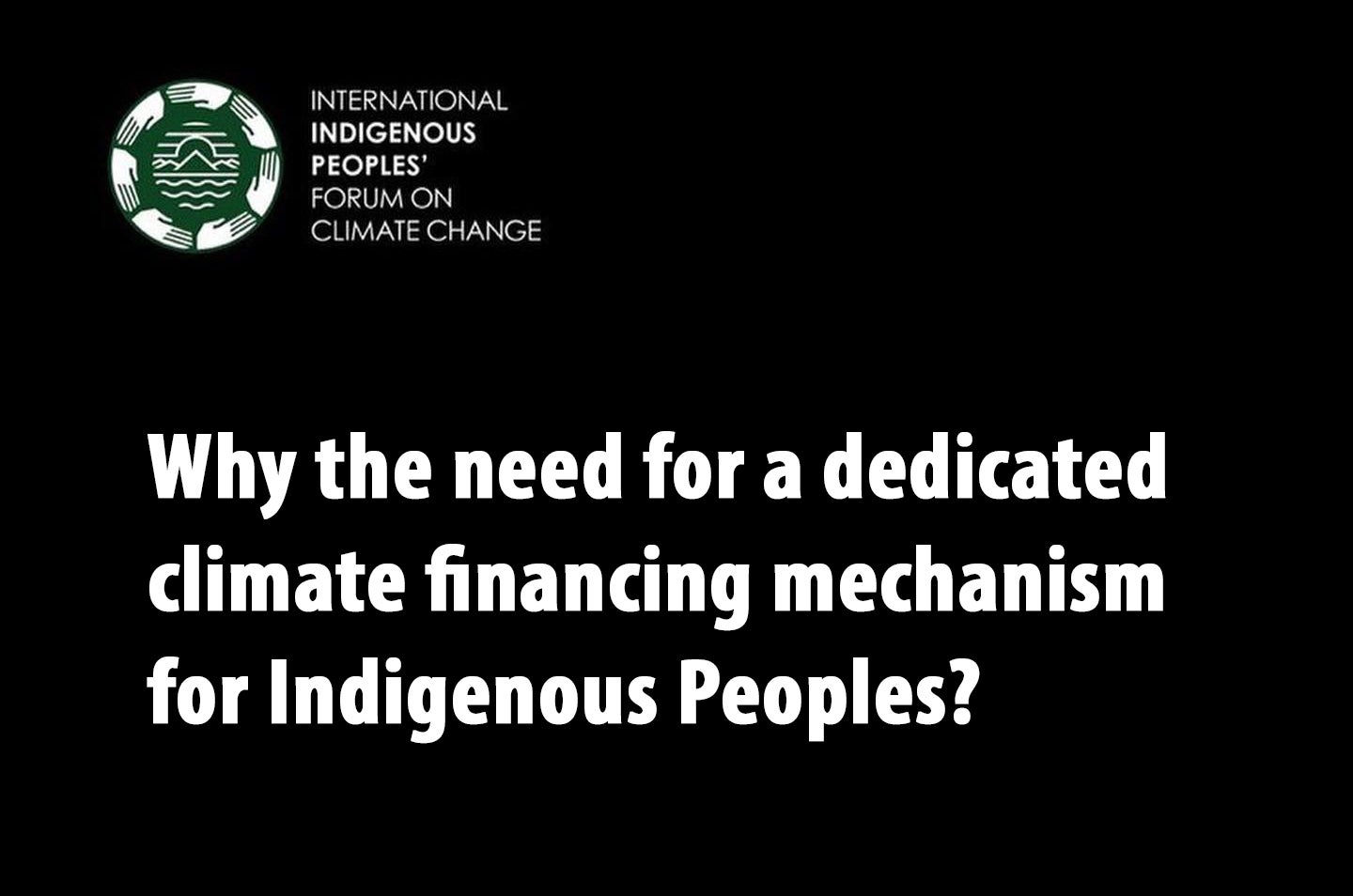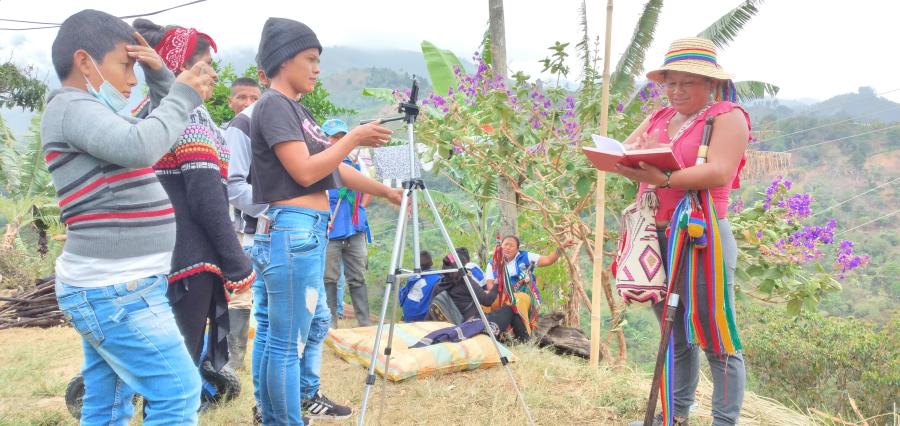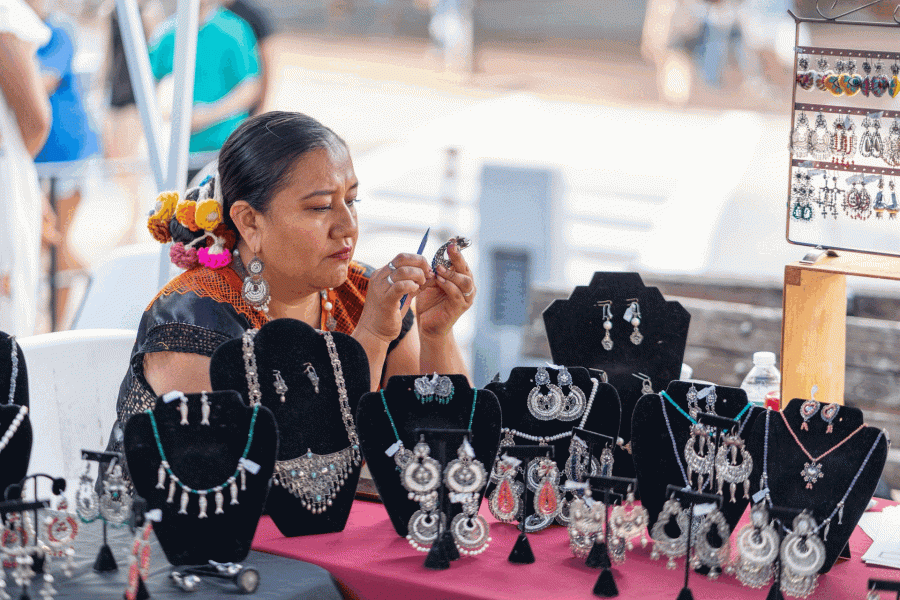
By CS Staff
From October 31 to November 12, 2021, the United Nations Framework Convention on Climate Change (UNFCCC) Conference of Parties (COP 26) took place in Glasgow, Scotland. As Cultural Survival reflects on the outcomes of COP26, we can’t help but feel that despite the tremendous efforts brought forth by Indigenous Peoples and our delegations from across the world, global leaders failed to act on the urgency of the climate crisis. Global leaders failed to empathize with what we, as Indigenous Peoples, experience on a daily basis-- the direct impacts and catastrophes of climate change. If the climate crisis is to be abated, and if we are to reach the goal of limiting global warming to 1.5֯°C, the global community must wake up and acknowledge climate change is an urgent matter that requires true commitment and changed behaviors now.
This year, Indigenous Peoples represented the second-largest civil society delegation in attendance at COP26, second only to oil and gas lobbyists which accounted for 500+ delegates. The general feeling towards COP26 is best captured by Cultural Survival’s Lead on Brazil and COP26 delegate, Edson Krenak (Krenak), “COP26 brought us many disappointments. As always, Indigenous Peoples, as guardians of the land did not sit at the table where negotiations and decisions were made. States continue, together with corporations, to try to save the economy, capital, the money machine that is capitalism or colonialism - in this context, it is only these terms that are interchangeable, and they are not working to save the planet!”
Nevertheless, we are resilient and adaptive Peoples, and we will continue to do our part in holding our sacred responsibilities towards Mother Earth. As always, it is a pleasure to commune and gather with our Indigenous relatives from around the world and this gives us renewed hope. Again, in Edson Krenak’s words, “I realized that it is not just a colonial past and a condition of vulnerability that unites and defines us, but our ancestral pedagogy: we all learn by listening to the voice of the other species! During this time, Indigenous Peoples from many parts of the world gathered at the International Indigenous Peoples’ Forum on Climate Change (IIPFCC) or Indigenous People’s Caucus to discuss and agree that our territories need to be protected, that our rights, the rights of fish, birds, animals, rivers, trees, and all other relatives of Mother Earth need to be respected.”
This article hopes to analyze and reflect on the occurrences of COP26, its accomplishments and deficiencies, particularly where it relates to Indigenous Peoples’ rights.
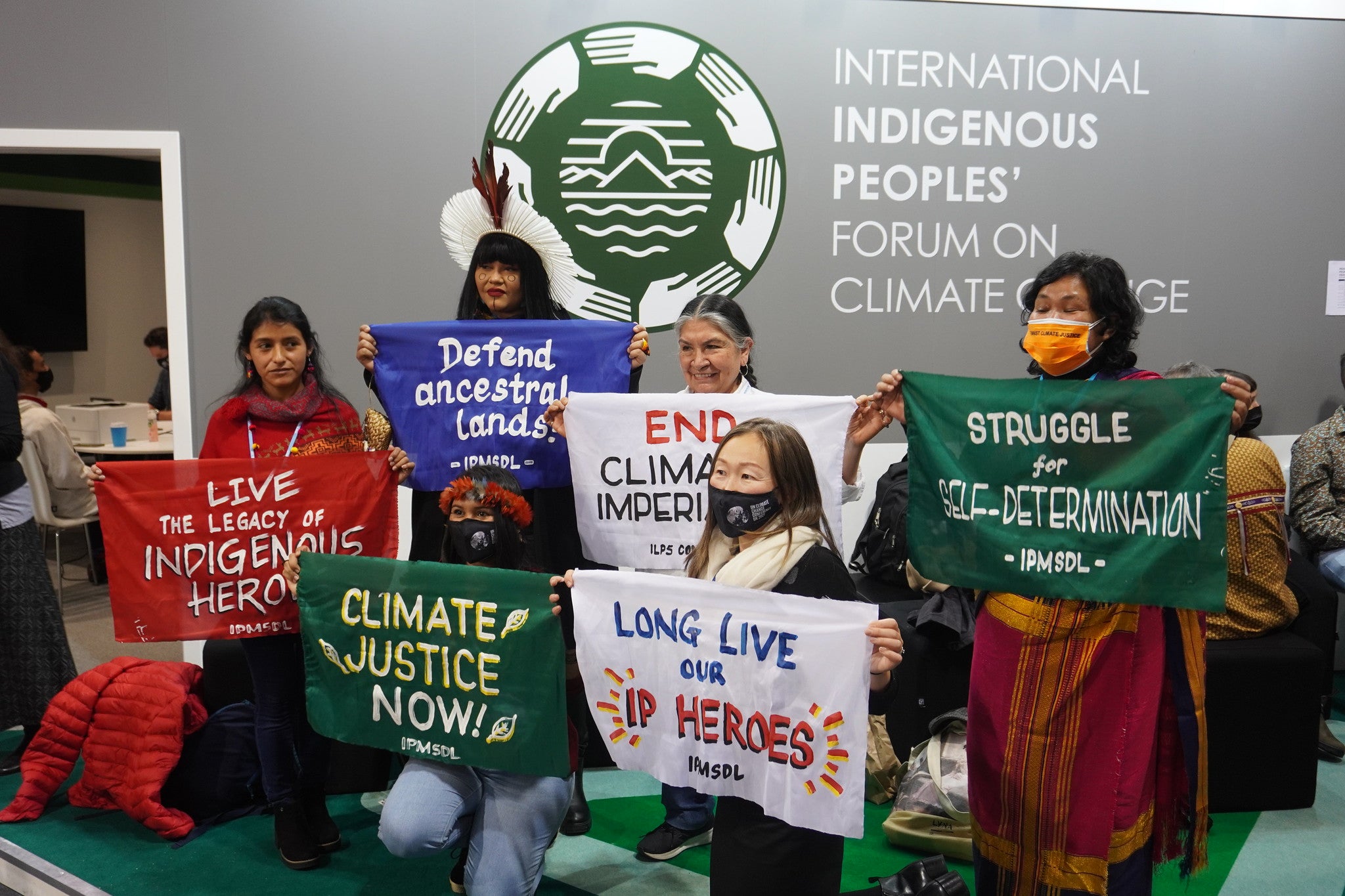
Increased Participation of Indigenous Peoples
Even though Indigenous Peoples were not at the helm of the decision-making machine, we were successful in lobbying and engaging with governments, and partners which allowed us to voice our concerns regarding climate issues in our communities. This allowed us to influence policies related to issues that will have a direct impact on our communities. We also reaffirmed and strengthened our resolve to continue to make our voices in these international spaces heard and continue to push for the recognition of human rights and the protection of Indigenous Peoples' rights. As previously noted, the IIPFCC was the second-largest delegation at COP26 next to the oil and gas lobbyists. This in and of itself is a major accomplishment for Indigenous Peoples around the world.
Graeme Reed (Anishinabee), Co-Chair of the IIPFCC spoke about the activities of the Local Communities and Indigenous Peoples Platform (LCIPP), which was established at COP24 in 2018 in Katowice, Poland, along with the creation of a newly constituted body, the Facilitated Working Group, which has seven Indigenous representatives that are self-selected from the seven UN socio-cultural regions and seven States, “At COP26, we had the first-ever annual Knowledge Keepers Gathering. Twenty-eight knowledge keepers from around the world organized within those seven UN socio-cultural regions and we were able to actually have our own meeting that allowed us to create our own space. This is the first time ever that we've had a meeting within the parameters of the Blue Zone, which is the UNFCCC-controlled framework that explicitly asked States to stay out. For me, that's just an indication of our ability and our growing ability to create space for Indigenous Peoples within these systems.”
Graeme Reed also commented on a few achievements, the adoption of the work plan (2022-2025) of the Local Communities and Indigenous Peoples Platform and securing one seat to represent Indigenous Peoples in the Climate Technology Centre and Network Advisory Body, the “first successful outcome was the adoption of the second three-year work plan of the Local Communities and Indigenous Peoples’ Platform, which was co-constructed by the Facilitative Working Group which is represented by Indigenous Peoples and States on a consensus basis. We got acceptance of that work plan to continue for another three years and prospectively open up additional space for those sorts of annual knowledge holder gatherings. We also landed a decision on the Climate Technology Center and Networks Advisory Body. For a while, Indigenous Peoples have been advocating to have one seat, even if one seat is insufficient, one seat [is] to represent Indigenous knowledge, science, and perspective on that climate technology network.”
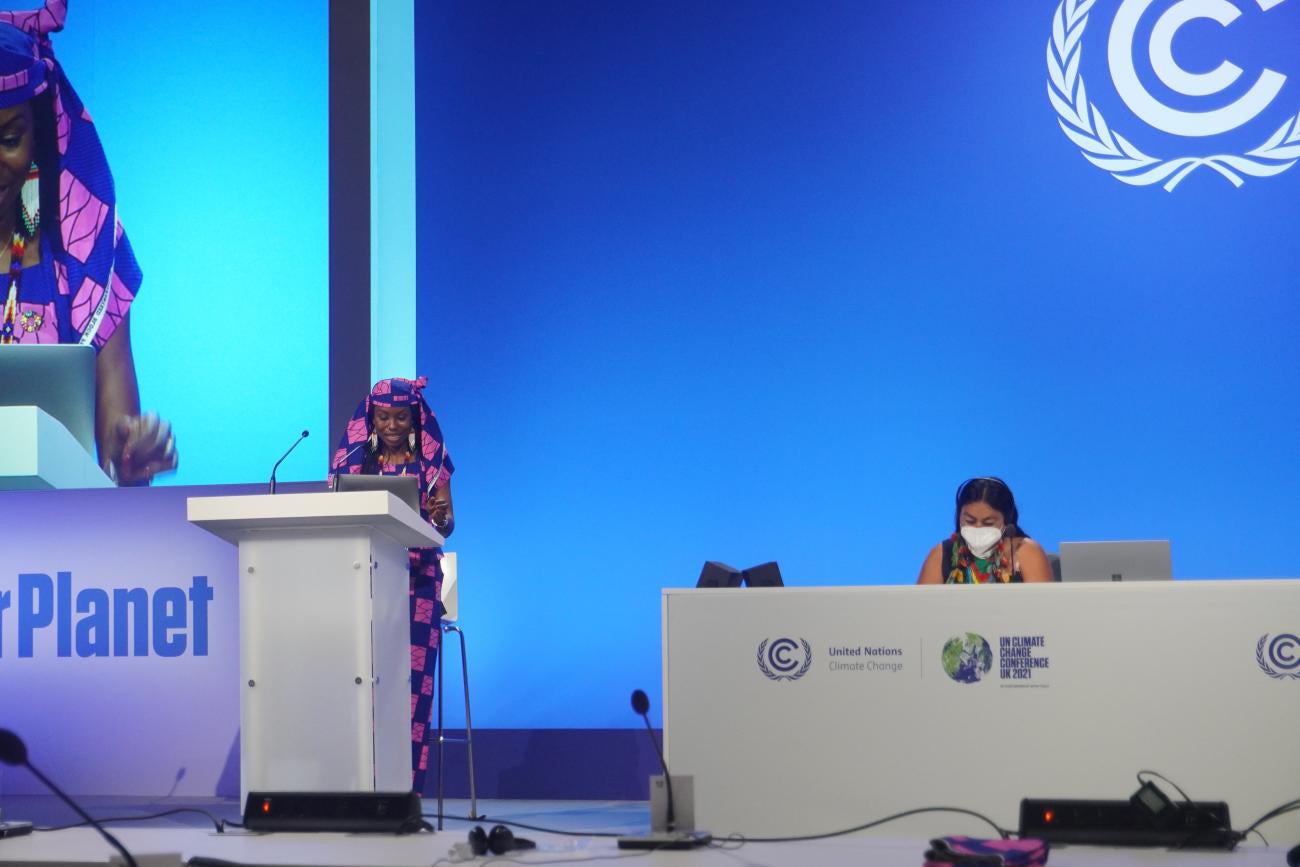
Adoption of the Glasgow Climate Pact
Another pivotal accomplishment coming out of COP26 is the adoption of the Glasgow Climate Pact by nearly 200 countries. This pact reinforced the Paris Agreement, especially where it concerns setting Global warming limits. The Paris Agreement set global warming limits “well below 2° Celsius,” however, the Glasgow Pact aims to set global warming limits to 1.5 degrees Celsius. It recognizes the fact that there is no safe limit for global warming. A fact that hopefully will resound globally and will have an impact on our carbon footprints. Numerous other Declarations reached at COP26 also aimed to reduce emissions, with the hope of maintaining the target of global warming at 1.5֯°C. However, the general consensus is that it is not enough. For instance, it remains to be seen what impact coal mining, petroleum, and natural gas collection and the continuation thereof will have on the proposed targets. Last minute in the negotiations of the Glasgow Pact, India was able to get language included in the Pact that references a “phase down” rather than “phase out” of coal mining. This reinforces the criticism that COP26 did not act on the urgency of the climate change crisis. This undoubtedly will have a direct impact on the global community’s ability to keep 1.5֯°C alive. The chief organizer of COP26, Alok Sharma, described the Glasgow Pact as “a fragile win,” affirming the general feeling that not enough is being done in respect of the climate change crisis.
Cultural Survival’s Director of Strategic Partnerships and Communications and COP26 delegate, Daisee Francour (Oneida) shares, “While member states at COP26 did not make the necessary commitments to truly reduce greenhouse gas emissions, the Glasgow Climate Pact was the first climate deal to reduce coal, a leading contributor to climate change. While more than 40 countries have committed to phasing out coal, in our own communities, we must leverage this small commitment to push our local and national governments to go beyond this phase-out. This means continuing to apply pressure on these governments to work towards a true, just transition, which actually addresses climate, economic, and social justice. We cannot afford to take any steps backwards as we collectively dream and co-create a new, green economy. We must center Indigenous leadership, rights, and Free, Prior and Informed Consent as we build new systems, infrastructure, and materials to build a more sustainable future.”
In addition to numerous member states committing phase out of coal, some of the leading coal-dependent countries like the United States, Australia, India, and China did not commit to the phase out. Additionally, major international banks also committed to effectively end all international public financing of new unabated coal power by the end of 2021. Member States such as Denmark, Canada, Italy, and the United States along with other public finance institutions created a joint statement that commits to ending international public support for the unabated fossil fuel energy sector by the end of 2022.
Inclusion of Human Rights Language in Article 6
A major focus of negotiations at COP26 was Article 6 of the Paris Agreement as it was one of the unresolved issues at COP21 held in Paris in 2015 when the Paris Agreement was signed. Therefore, the decision reached at COP26 in respect of Article 6 has been six years in the making. Article 6 serves as the rulebook on CO2 emissions, it is an accounting mechanism on how CO2 emissions are going to be calculated or accounted for. It sets out the rules for the use of Carbon Markets, Emissions Reduction, and National Climate Action Plans. Article 6 refers to a system of carbon trading that will allow big polluters to continue polluting. “Cultural Survival’s stance on Article 6 is that we do not believe in carbon market mechanisms as a climate change solution. We think they should be scrapped altogether. In the context of COP26 negotiations, these market mechanisms were disguised as nature-based solutions. Nevertheless, the IIPFCC decided to act within the proposed framework and push for the inclusion of references to human rights and Indigenous Peoples’ rights throughout the text of Article 6. The final text mentions the need to respect Indigenous Peoples’ rights but does not mention the need to obtain our Free, Prior and Informed Consent,” says Galina Angarova (Buryat), Cultural Survival Executive Director.
While the lobbying efforts of the IIPFCC resulted in getting language for the recognition of human rights and Indigenous rights in several provisions of this Article 6, as now evidenced in the Glasgow Climate Pact, the inclusive language could best be described as vague or general, lacking the vigor we hoped for. Unfortunately, other proposals made by the IIPFCC were not included. The International Indigenous Peoples’ Forum on Climate Change described their consternation, “[w]e welcome the inclusion of the rights of Indigenous Peoples in some provisions of Article 6. However, we wanted to see an independent grievance mechanism, not a process in Article 6.4. We are also dismayed at the exclusion of our rights in activity design and implementation. In particular, the consultation provision in 6.4 is inadequate. It needs to include applicable international standards and ensure compliance with the rights of Indigenous Peoples to Free, Prior and Informed Consent.”
Addressing Loss and Damage
Another area of concern to many at COP26, including Indigenous Peoples and developing countries, is in the area of loss and damage caused by climate change effects. What came out of the Paris Agreement was the creation of a finance facility that would provide assistance to developing countries facing environmental degradation resulting from climate change effects, i.e. loss and damage. Therefore, the expansion of this loss and damage finance facility was a major agenda for developing countries at COP26. They pushed hard and hoped for a decision, in the new Glasgow Pact, seeking the expansion of the loss and damage finance facility. Unfortunately, their efforts were unsuccessful, as developed countries vetoed their attempts at expansion. Nonetheless, the Glasgow Pact acknowledges existing loss and damage already caused by the impact of climate change and that this will only increase and pose greater threats to societies, economies, and the environment. Also notable is paragraph 62 of the Glasgow Pact, which “acknowledges the important role of a broad range of stakeholders at the local, national and regional level, including Indigenous Peoples and local communities, in averting, minimizing and addressing loss and damage associated with the adverse effects of climate change.”
However, major criticisms regarding the decision in the area of loss and damage are that it failed to set aside new funding for developing countries much less to Indigenous communities, despite the fact that they face more direct negative effects of climate change. As previously noted, there was major push back from developed countries related to the expansion of funding from entering the Glasgow Pact. For many, this is disappointing as developed countries seem to continually skirt their pledges and obligations, particularly, in light of the fact that their promise to provide $100 billion per year to fight climate change still has not been fulfilled. “It is a well known fact that the carbon footprints of Indigenous Peoples and some small developing countries are minimal in comparison to those of developed countries. Developed countries are the worst polluters of Mother Nature, however, they get to skirt their obligations, while Indigenous Peoples get to bear the brunt of these bad decisions. This is unfair to say the least,” says Monica Magnusson (Q’eqchi Maya), Director of Advocacy and Policy at Cultural Survival.
Funding and access to it were at the heart of COP26 discussions. For instance, a pledge of $19.2 billion was endorsed by world leaders at COP26 for the protection of forests and to end deforestation. Additionally, recognizing the invaluable role that Indigenous Peoples play in climate change solutions and mitigation, several philanthropic organizations pledged funding in the amount of $1.7 billion dollars, to fund the efforts of Indigenous Peoples in their fight against climate change. Of this, the IIPFCC said, “we appreciate the commitment of $1.7 billion to protect forests and land led by Indigenous Peoples and look forward to designing our own inclusive mechanisms that will benefit all socio-cultural regions… It is essential that Indigenous Peoples have direct access to finance, rather than systems that route funding through intermediary organizations that are completely inaccessible and unreliable. Dedicated climate financing for Indigenous Peoples could provide support for us to maintain, restore and enhance our knowledge and practices that care for the Earth, to promote Indigenous food sovereignty, create an appropriate structure for loss and damage to compensate Indigenous Peoples, and advance the rights of Indigenous women and persons with disabilities within the climate agenda.”
Indigenous Peoples welcome these funding pledges, and support from partners who see and recognize the invaluable role that Indigenous Peoples play in safeguarding our planet. It is, however, our hope that they will create or refine existing funding mechanisms that are directly accessible to Indigenous Peoples and will directly reach local communities at the forefront of climate change so that they can continue to sustainably manage forests, lands, and territories for the benefit of all.
Adoption of the Just Transition Declaration
Perhaps recognizing that the decision reached in the Glasgow Pact about limiting emissions, is nowhere close to meeting proposed targets, several declarations came out of COP26 aiming to reduce greenhouse gas emissions. One of particular interest is the Just Transition Declaration, which recognizes the need to include everyone, especially the vulnerable, in the transition to net zero emissions and environmentally sustainable economy. The preamble to the Declaration, acknowledges that vulnerable groups are most affected by climate change effects including those living in poverty, workers in carbon intensive industry and production. It also notes that climate change mitigation and adaptation must be inclusive and must benefit the most vulnerable by distributing resources equitably and ensuring economic and political empowerment, among other things. The Declaration stated, “ a commitment to gender equality, racial equality and social cohesion; protection of the rights of Indigenous Peoples; disability inclusion; intergenerational equity and young people; the promotion of women and girls; marginalized persons’ leadership and involvement in decision-making; and recognition of the value of their knowledge and leadership; and support for the collective climate action of diverse social groups. Social dialogue as well as rights at work are indispensable building blocks of sustainable development and must be at the centre of policies for strong, sustainable, and inclusive growth and development.”
The Declaration also acknowledges the need for safeguards in existing and new supply chains, and the importance of creating decent work for all, such as the most vulnerable. It recognizes the need to respect human rights and the need to promote social dialogue and engagement between all those who will be affected by the transition to green economies, such as governments, employers, and workers. Notably, it recognizes the importance of upholding human rights and the protection of the rights of Indigenous Peoples as well as acknowledging International Labor Organization guidelines. This is a plus for Indigenous Peoples’ rights recognition, human rights, and worker’s rights.
However, while this Declaration recognizes Indigenous Peoples’ rights, it could have included stronger human rights language such that of the United Nations Declaration on the Rights of Indigenous Peoples (UNDRIP) and language affirming the rights of Indigenous peoples to Free, Prior, and Informed Consent (FPIC). This would have particular importance and a big win for Indigenous Peoples because mining is occurring and will continue to occur on Indigenous territories. “Had the Declaration included stronger human rights protection language, it would have illustrated its commitment to focus more on the JUST aspect of transition and less on economic benefits,” says Coc Magnusson. Because that is not the case, Indigenous Peoples have to be more vigilant and will have to continue to hold states accountable to ensuring that UNDRIP and FPIC standards are operationalized within their territories.
Despite the numerous declarations that came out of COP26, such as the foregoing, declarations are not legally binding on signatories. But the benefit and utility in declarations are that they illustrate the intent of the parties to the agreement and perhaps it creates a moral obligation to stand by one’s pledge. This intent of parties with the support or pressure from civil society, local communities, and Indigenous Peoples will become stronger until changes are achieved. “Now, more than ever, Indigenous Peoples and other movements will continue to unify to pressure States to respect Indigenous rights, human rights, and FPIC. Parallel to this process, it is important to reflect on the consumerism in our households, especially in developed countries as consumers are the final clients of what is produced from extractivism. Over and over, I heard Elders say at COP26: ‘take only what you need and use it wisely',” says Avexnim Cojti, Cultural Survival Director of Programs and COP26 delegate.
Given the overall lack of action for the urgency of the climate crisis by the global leaders, as evidenced in the decisions, pacts, and declarations reached at COP26, Indigenous Peoples recognized that there is so much more to be done. Much of this work, like keeping member states accountable to their commitment will fall on our shoulders. We recognize that if we are to win the climate change war, it means we as Indigenous Peoples will have to work harder, and we will have to amp up our efforts both at the local and international levels. We have to do everything that we can to ensure our local Indigenous communities get the financing they need to continue to steward their lands in a sustainable and environmentally respectable manner. We will continue to advocate for their collective rights to lands and resources. However, we recognize that we could talk all we want at global conferences, but the real effects and changes will only happen at the local level. “Local resilience requires local traditional knowledge. We cannot address a global crisis without focusing on local, place-based solutions,” stated Galina Angarova (Buryat), Cultural Survival Executive Director. Supporting Indigenous communities at the local level supports and enriches the ecosystem in that region, and the health of that regional ecosystem impacts that of surrounding ecosystems. This strengthens the interconnected and interdependent web of ecosystems (or web of life), and Indigenous Peoples’ traditional knowledge is the catalyst for the climate change mitigation our world desperately needs. We, at Cultural Survival, are committed to our Indigenous communities that we partner with, and we intend to continue to expand our efforts in ensuring the promotion and protection of Indigenous Peoples' and human rights.
